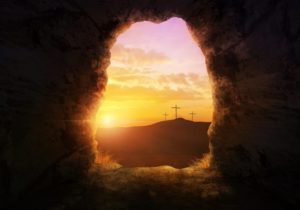Luke was not one of the twelve disciples. He enters the story after the resurrection of Jesus when Paul finds in him a trusted companion. His writing is for a man named Theophilus. He desires for him to know, with certainty, the things the believers had taught him. Thus he writes an orderly account of a risen Lord, in the Books of Luke and Acts. Within his record, Luke includes the reality of a spiritual world, a physical world, and the power of a risen Lord.

A Spiritual World
In telling the story, he includes the reality of the spiritual world. First, as he explains the desire of the religious leaders to kill Jesus, he states Satan entered Judas. There is a power at work in this story, beyond human sight. Further, when Jesus talks to Peter about his upcoming denial, Luke includes vital background information. Jesus told Peter that Satan had asked for him. Satan wanted to sift Peter like wheat. Jesus, however, interceded. He prayed Peter’s faith would not fail. He prayed for Peter to return to strengthen his brothers. Then, as Luke records Jesus praying in the garden, he gives a vivid portrayal of Jesus’ agony. He speaks of an angel appearing to Jesus, from heaven, to strengthen Him. The battle of His soul resulted in sweat like great drops of blood. At His arrest, Jesus says, “When I was with you daily in the temple, you did not try to seize me. But this is your hour and the power of darkness.” There were far more sinister yet glorious plans behind the veil of humanity. Finally, when the dark hour had passed, the angels announced, “Why do you seek the living among the dead? He is not here, but is risen.” The spiritual world was as real as the physical.
A Physical World
In the physical world, Jesus teaches His competitive disciples to follow His example and be servants. In addition, Luke tells how two rival politicians become friends through their common dilemma of what to do with Jesus. Also, there is a recording of Jesus on His way to the cross, speaking to the mourners along the route. “Daughters of Jerusalem, do not weep for Me, but weep for yourselves and for your children.” Of the thieves on the cross, Luke writes of one who believes and receives the promise, “today you will be with Me in Paradise.” He writes of the inability of the disciples to believe Jesus had risen. The way humanity thinks and acts are part of our physical world.
The Risen Lord
Finally, the spiritual world intersects the physical world through the risen Lord! I love how Luke tells of the two walking to Emmaus. Caught up in their sorrow, and the circumstances they were experiencing, they could not see Jesus walking with them. He had to reveal Himself. Then as He meets with his disciples over the next forty days, He opens the words written by Moses, all the prophets, and the Psalms to explain how all those writings were about Himself. He opened their understanding. He revealed it to them. The disciples didn’t understand the necessity of Jesus’ suffering until He revealed it to Him. “It was necessary for the Christ to suffer and to rise from the dead the third day, and that repentance and remission of sins should be preached … you are witnesses … I send the promise of My Father upon you.. wait until you have the power from on high. ” Before He entered into His glory, He blessed them.”
Though Luke continued the Easter narrative in the Book of Acts, he concludes this portion with worship, praise and “great joy.”
When God, who we cannot see, is at work in a world which sometimes is too much with us, the Risen Lord opens our eyes to reveal HE LIVES. Luke includes the reality of a spiritual world, a physical world, and the power of a risen Lord.
1 comment
Very interesting how the gospel authors brought out differing points about Jesus… who He was… and what He did while living on earth. Thank you for your writings and insight!